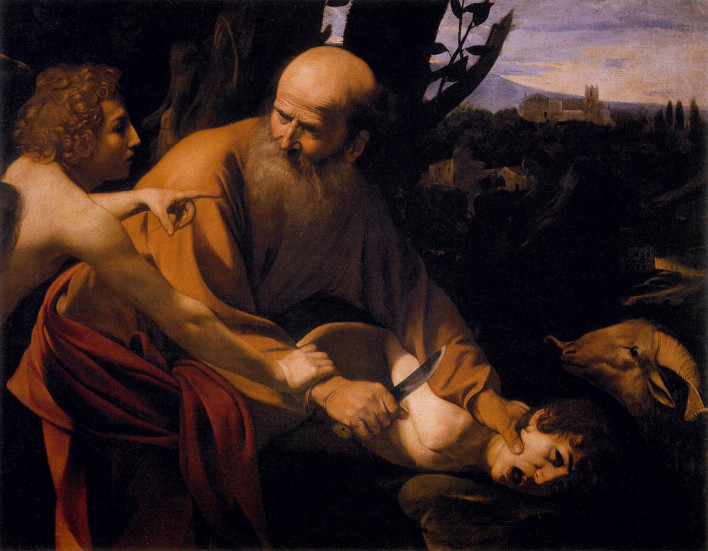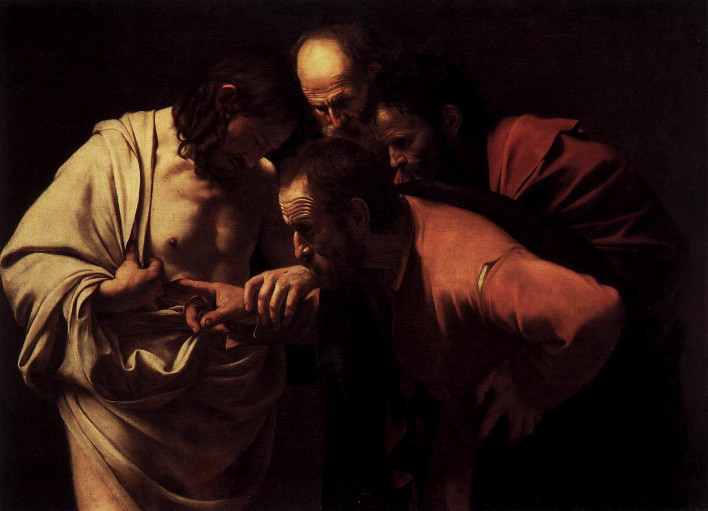Tests of faith, the lunatic's friends
Richard Law, UTC 2015-09-30 16:05
The voices in your head
Today, some Bible study for you. Here is a story that has always troubled me, the famous story of 'The Sacrifice of Isaac' from the King James Bible (AV), Genesis 22:1-18.
1 And it came to pass after these things, that God did tempt Abraham, and said unto him, Abraham: and he said, Behold, here I am. 2 And he said, Take now thy son, thine only son Isaac, whom thou lovest, and get thee into the land of Moriah; and offer him there for a burnt offering upon one of the mountains which I will tell thee of.
Abraham hears a voice in his head. It tells him to take his only son, Isaac, and kill him as a sacrifice. Abraham does not question this order. Abraham is clearly quite convinced that the voice is that of God.
3 And Abraham rose up early in the morning, and saddled his ass, and took two of his young men with him, and Isaac his son, and clave the wood for the burnt offering, and rose up, and went unto the place of which God had told him. 4 Then on the third day Abraham lifted up his eyes, and saw the place afar off. 5 And Abraham said unto his young men, Abide ye here with the ass; and I and the lad will go yonder and worship, and come again to you.
Having arrived near to the place for the sacrifice, Abraham lies to Isaac and his servants about what he is about to do. 'I and the lad will … come again to you'. What is the purpose of this lying? Would the servants and Isaac resist if Abraham told them what he was going to do?
6 And Abraham took the wood of the burnt offering, and laid it upon Isaac his son; and he took the fire in his hand, and a knife; and they went both of them together. 7 And Isaac spake unto Abraham his father, and said, My father: and he said, Here am I, my son. And he said, Behold the fire and the wood: but where is the lamb for a burnt offering? 8 And Abraham said, My son, God will provide himself a lamb for a burnt offering: so they went both of them together.
Abraham lies to Isaac again about what he is going to do to him, we assume to keep his victim calm. Isaac has nothing to say here about the prospect of having his throat slit and being incinerated on a pyre. The voice in Abraham's head is the only voice that counts. Abraham even makes Isaac carry the wood for his sacrificial pyre.
9 And they came to the place which God had told him of; and Abraham built an altar there, and laid the wood in order, and bound Isaac his son, and laid him on the altar upon the wood. 10 And Abraham stretched forth his hand, and took the knife to slay his son.
Abraham is now on the point of killing his beloved son. In the text, Isaac is still a silent participant, although we can probably assume that he has realised what is going to happen to him and is expressing some degree of unhappiness.
11 And the angel of the Lord called unto him out of heaven, and said, Abraham, Abraham: and he said, Here am I. 12 And he said, Lay not thine hand upon the lad, neither do thou any thing unto him: for now I know that thou fearest God, seeing thou hast not withheld thy son, thine only son from me.
The angel intervenes and stops the slaughter. He tells Abraham that he has passed the faith test. Caravaggio famously painted this scene, showing us the terror of Isaac, the urgency of the angel and the blank, robotic stare of Abraham. The stare of the extremist and the lunatic down the ages.

Caravaggio: The Sacrifice of Isaac [1601-02], Galleria degli Uffizi, Florence.
13 And Abraham lifted up his eyes, and looked, and behold behind him a ram caught in a thicket by his horns: and Abraham went and took the ram, and offered him up for a burnt offering in the stead of his son.
God magically provides a ram to use as a sacrifice instead of Isaac, leaving us puzzling a little as to why the ram has to be killed now that Abraham has passed the faith test with flying colours. The ram does not even belong to Abraham, so there is no sacrifice as such.
… 15 And the angel of the Lord called unto Abraham out of heaven the second time, 16 and said, By myself have I sworn, saith the Lord, for because thou hast done this thing, and hast not withheld thy son, thine only son: 17 that in blessing I will bless thee, and in multiplying I will multiply thy seed as the stars of the heaven, and as the sand which is upon the sea shore; and thy seed shall possess the gate of his enemies; 18 and in thy seed shall all the nations of the earth be blessed; because thou hast obeyed my voice.
An angel reaffirms to Abraham that he has passed the test, having shown himself willing to kill the thing most precious to him. He shall now reap the reward 'because thou hast obeyed my voice'.
The moral of this tale is simple: If you hear a voice in your head telling you to do something terrible, you must obey it unconditionally, even if it costs you your life or the lives of others. Your faith is being tested. What has so troubled me about this story is that I have never – never – read or heard it told with anything but passive acceptance of its content. If you, like Abraham did, just assume that the voice in his head is really that of God, then, I suppose, the tale is a relatively harmless one. If the voice is not God's, well, that is an entirely and appallingly different matter. Every murderous lunatic can quote this story as a vindication of anything.
Only believe
Here's another Bible story that has always troubled me, this time from the New Testament. It is the famous story of 'Doubting Thomas' from the King James Bible (AV), John 20:24-29. After his crucifixion and resurrection from the dead Jesus had appeared to the disciples.
24 But Thomas, one of the twelve, called Didymus, was not with them when Jesus came. 25 The other disciples therefore said unto him, We have seen the Lord. But he said unto them, Except I shall see in his hands the print of the nails, and put my finger into the print of the nails, and thrust my hand into his side, I will not believe.
Thomas the sceptic refuses to believe the reports of the other disciples. Let's face it, this coming back from the dead is not a thing you meet every day.
26 And after eight days again his disciples were within, and Thomas with them: then came Jesus, the doors being shut, and stood in the midst, and said, Peace be unto you. 27 Then saith he to Thomas, Reach hither thy finger, and behold my hands; and reach hither thy hand, and thrust it into my side: and be not faithless, but believing.
Jesus to Thomas: here is the evidence you wanted, but you should not need it – faith is sufficient. Once again, Caravaggio has wonderfully pictured the scene for us in a deservedly famous painting:

Caravaggio: The Incredulity of Saint Thomas [1601-02], Schloss Sanssouci, Potsdam.
28 And Thomas answered and said unto him, My Lord and my God. 29 Jesus saith unto him, Thomas, because thou hast seen me, thou hast believed: blessed are they that have not seen, and yet have believed.
The moral of this tale: The blessed just believe and do not require proof. Belief without questioning is laudable. Those who ask for evidence are inferior. If you believe something do not ask for evidence. The troubling thing about this story is the elevation of belief without evidence above rational empiricism. Belief should not be questioned, we are told.
0 Comments
Server date and time:
Browser date and time:
Input rules for comments: No HTML, no images. Comments can be nested to a depth of eight. Surround a long quotation with curly braces: {blockquote}. Well-formed URLs will be rendered as links automatically. Do not click on links unless you are confident that they are safe. You have been warned!